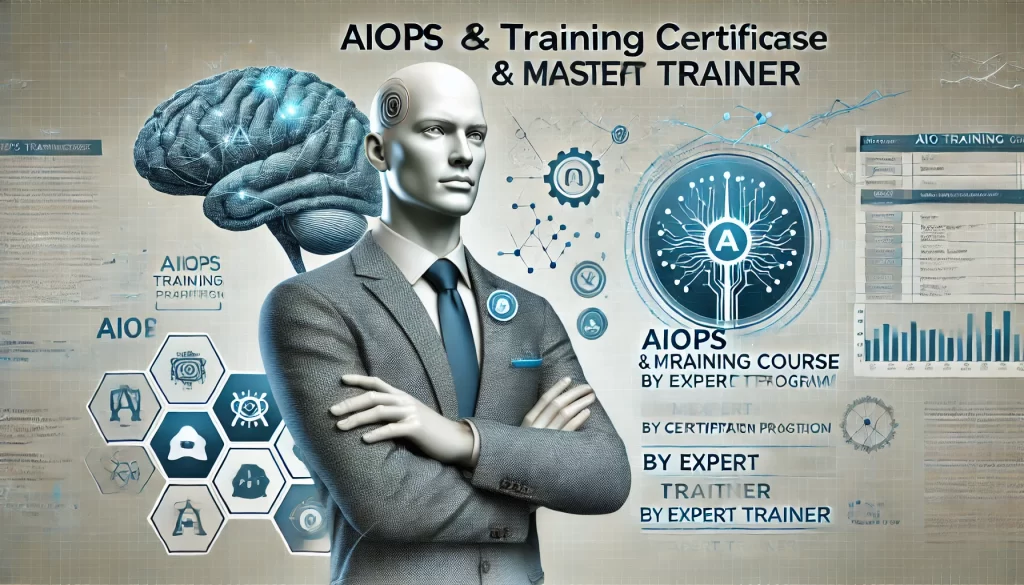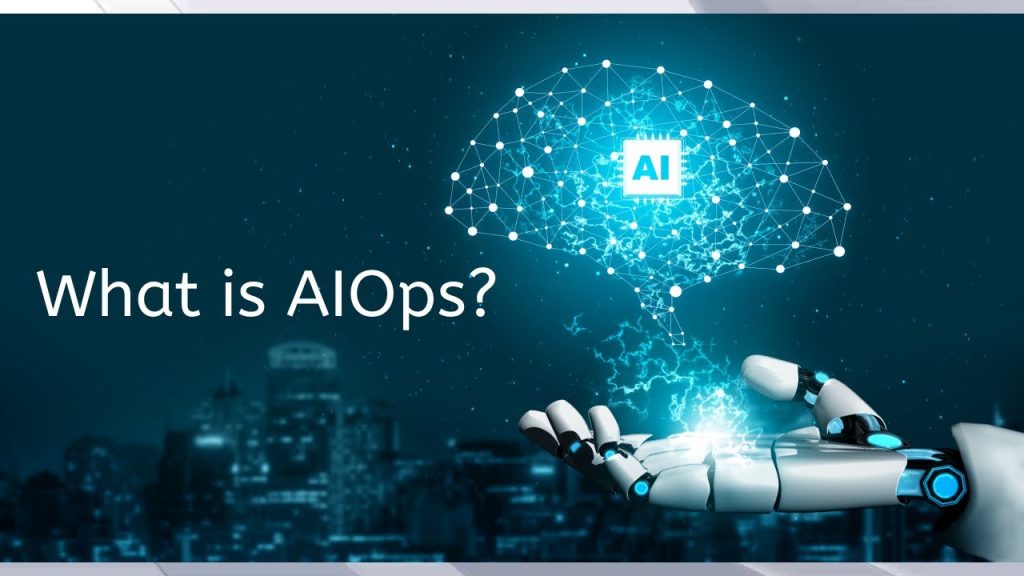
The AiOps Training Course & Master Certification Program by theaiops.com is a specialized course designed to help IT professionals, DevOps engineers, and data scientists master the principles and tools of Artificial Intelligence for IT Operations (AIOps). Led by expert trainer Rajesh Kumar from RajeshKumar.xyz, this program delves into the application of AI and machine learning to IT operations, enabling organizations to improve operational efficiency, automate anomaly detection, and enhance root cause analysis. Participants will gain hands-on experience with leading AIOps platforms and tools, learning how to build intelligent monitoring systems, automate incident management, and optimize resource utilization. The course also prepares participants for the AIOps Master Certification, validating their expertise and positioning them as skilled professionals in the fast-growing field of AIOps. By the end of the training, learners are equipped to implement AIOps solutions that can transform IT operations, making them more proactive, data-driven, and resilient in today’s complex IT environments.
What is AIOps?

AIOps, or Artificial Intelligence for IT Operations, is a framework that uses artificial intelligence and machine learning to automate and enhance IT operations management. By analyzing vast amounts of operational data in real-time, AIOps enable IT teams to detect anomalies, predict potential issues, and automate root cause analysis, leading to faster and more accurate incident resolution. Unlike traditional monitoring tools that rely on static rules, AIOps continuously learn from data patterns, adapting to the complex, dynamic nature of modern IT environments, especially in cloud and hybrid infrastructures. It integrates data from multiple sources, including logs, metrics, and events, to provide a holistic view of system performance. This proactive approach helps organizations reduce downtime, improve operational efficiency, and manage resources more effectively. As a result, AIOps is transforming IT operations, making them more resilient, scalable, and responsive to business needs.
Why AIOps is Important
AIOps has become indispensable in modern IT for several key reasons, including:
- Complex Infrastructure and Data Volumes: Today’s IT environments generate massive amounts of data across distributed and hybrid infrastructures. AIOps tools analyze data efficiently, extracting actionable insights to improve system performance.
- Proactive Incident Management: Unlike traditional IT operations that react to issues after they occur, AIOps uses machine learning models to predict and mitigate potential incidents proactively, reducing downtime and enhancing system reliability.
- Cost Reduction Through Automation: By automating routine operational tasks, AIOps reduces the manual workload on IT teams, enabling organizations to allocate resources more effectively and reduce overall operational costs.
- Faster Mean Time to Resolution (MTTR): AIOps minimizes MTTR by automatically detecting anomalies, identifying the root cause of issues, and often taking corrective action without human intervention.
- Improved Security and Compliance: AIOps solutions help ensure that systems meet compliance standards by continuously monitoring security threats and anomalies, reducing risks through real-time alerts and automated responses.
Course Features
The AIOps course at theaiops.com is designed to be both comprehensive and hands-on, offering the following unique features:
- Extensive Theoretical and Practical Learning: This course combines in-depth lectures on AIOps concepts with guided hands-on labs, allowing participants to apply learning to real-world scenarios.
- Access to Cutting-Edge AIOps Tools: Participants will work directly with industry-standard AIOps tools like Prometheus, Datadog, ELK Stack, and PagerDuty, gaining practical skills that can be directly applied in their jobs.
- Customized Projects and Case Studies: Real-world projects allow learners to simulate enterprise scenarios, focusing on anomaly detection, automation, and end-to-end incident management.
- Resource Library and Post-Course Materials: All participants receive lifetime access to a curated library of AIOps resources, including articles, video tutorials, and advanced guides on each tool covered.
- Expert Mentorship: Led by Rajesh Kumar, a seasoned AIOps practitioner, the course provides opportunities for participants to interact with an expert, gaining insights from his extensive experience and practical knowledge in AI-driven operations.
Training Objectives
This AIOps course is structured to equip participants with the following competencies and skills:
- Developing Machine Learning Models for IT Operations: Learn to build machine learning models that can analyze and interpret IT data, enabling predictive analysis and anomaly detection.
- Deploying Monitoring and Observability Frameworks: Master the setup and configuration of monitoring frameworks, collecting valuable data on system performance and health.
- Implementing Incident Response Automation: Configure automated incident response workflows using tools like PagerDuty and ServiceNow, reducing response times and minimizing human intervention.
- Data Processing and Log Analysis Skills: Gain the expertise to manage logs, correlate events, and visualize data insights through platforms like Elasticsearch and Kibana.
- Integrating AIOps with CI/CD Pipelines: Understand the role of AIOps in DevOps pipelines and how AIOps practices enhance CI/CD by improving visibility, monitoring, and alerting in deployment environments.
Target Audience
This course is suitable for:
- IT Operations and Support Professionals: Those working in IT operations will benefit from AIOps skills in monitoring, alerting, and incident response.
- DevOps Engineers and SREs: Engineers responsible for maintaining uptime and service reliability will gain advanced automation and predictive monitoring capabilities.
- Data Scientists and Analysts in IT Operations: Professionals interested in applying data science and analytics in IT operations will learn how to build and deploy ML models within AIOps environments.
- System Administrators and Network Engineers: IT staff involved in system monitoring and troubleshooting will enhance their skills with AI-powered tools.
- IT Managers and Architects: Leaders responsible for infrastructure and team management will understand how to implement AIOps for enhanced efficiency and streamlined operations.
Training Methodology
The AIOps course combines various training methods for an immersive learning experience:
- Lecture-Based Theory Sessions: These sessions introduce core concepts of AIOps, including data handling, model building, and incident response. Topics are presented in an engaging, easily understandable format to build a strong foundation.
- Practical Workshops and Hands-On Labs: Workshops provide step-by-step guidance on setting up tools, configuring monitoring and logging systems, and applying machine learning models to real-world data.
- Collaborative Group Exercises: Participants work together on scenarios, solving AIOps challenges in small groups to enhance teamwork and problem-solving skills.
- Interactive Q&A and Feedback: Dedicated Q&A sessions allow participants to clarify doubts, gain insights, and receive direct feedback on assignments and projects.
Certification Program
Upon course completion, participants receive an industry-recognized AIOps Certification from DevOpsSchool.com, which verifies their expertise in AI-driven IT operations. The certification includes:
- Certificate of Achievement: Validates that participants have acquired practical and theoretical knowledge in AIOps and its tools, making them valuable assets in the IT operations field.
- Verification and Badging: Digital badges and certificates can be added to LinkedIn profiles, portfolios, and resumes to showcase their achievement to potential employers.
- Lifetime Access to Certification Materials: Participants receive lifetime access to course materials, updates, and resources, ensuring they remain current with the latest AIOps trends and tools.
Agenda (Day-Wise)
Day 1: Foundations of AIOps and Data Collection
- Introduction to AIOps: Understanding AI, machine learning, and their applications in IT.
- Monitoring and Data Collection Essentials: An overview of tools like Prometheus, Grafana, and Datadog.
- Lab Setup: Configuring a monitoring environment using Prometheus and Grafana.
- Hands-on Lab: Setting up and configuring a monitoring dashboard.
Day 2: Data Processing, Analysis, and Incident Management
- Building Machine Learning Models: Introduction to ML frameworks and data pre-processing.
- Log Management with ELK Stack: Configuring and analyzing logs with Elasticsearch, Logstash, and Kibana.
- Incident Response Automation: Setting up automated responses and alerting with PagerDuty.
- Hands-on Lab: Developing a log-based anomaly detection model using ELK.
Day 3: Advanced AIOps, Automation, and Integration
- Cloud Integration and Scalability: Implementing AIOps in cloud environments using AWS, GCP, or Azure.
- Automation with CI/CD: Integrating AIOps in CI/CD pipelines for improved monitoring and deployment.
- Security in AIOps: Ensuring compliance and security in automated environments.
- Hands-on Lab: Automating incident response workflows with PagerDuty and ServiceNow.
Lab Setup
Participants will be guided through a lab setup process, ensuring they have all necessary software and configurations:
- Hardware Requirements: A laptop with at least 8GB RAM, a multi-core processor, and stable internet connectivity.
- Required Software: Python, Jupyter notebooks, Docker, Prometheus, ELK Stack, and cloud credentials (optional but recommended).
- Detailed Setup Guide: A comprehensive guide covering software installation, environment setup, and troubleshooting.
- Cloud Resources: Access to AWS, GCP, or Azure; options for local setups will also be provided for participants without cloud access.
Trainers
The course is taught by Rajesh Kumar, an experienced DevOps and AIOps expert, known for his practical, results-oriented teaching style. With extensive experience in IT operations, Rajesh brings a wealth of knowledge on implementing AI and machine learning in complex operational settings, ensuring participants gain skills that translate directly into real-world applications.
Frequently Asked Questions (FAQ)
- What are the prerequisites for the AIOps course?
- Basic knowledge of Python, IT operations, and monitoring tools is recommended.
- Does this course require machine learning experience?
- No, the course covers essential machine learning principles.
- What practical skills will I gain?
- Participants will set up monitoring systems, build ML models, and automate incident response workflows.
- Is this course suitable for beginners in AIOps?
- Yes, the course is designed to be accessible to beginners while also offering depth for experienced IT professionals.
- What career benefits does AIOps provide?
- AIOps skills are highly valued in modern IT, enhancing roles in IT operations, DevOps, and data-driven decision-making.
- What is the difference between AIOps and traditional IT monitoring?
- AIOps uses AI to analyze data in real-time and predict incidents, whereas traditional monitoring is reactive.
- How is log analysis conducted in AIOps?
- Participants will learn to manage and analyze logs using the ELK stack, visualizing insights in Kibana.
- Will I get lifetime access to the course material?
- Yes, participants retain access to materials and resources post-completion.
- What cloud platforms are covered in this course?
- The course includes cloud integrations with AWS, GCP, and Azure.
- Are there hands-on labs each day?
- Yes, each day includes hands-on labs to ensure skill application.
- What kind of certification will I receive?
- A certification from DevOpsSchool.com verifying expertise in AIOps practices.
- How does AIOps improve response time to incidents?
- AIOps automates incident detection and response, reducing human intervention.
- Will there be exams or assessments?
- Yes, the course includes assessments to validate understanding.
- Are there networking opportunities?
- Yes, participants can join an alumni network for ongoing support.
- Is there any post-course support?
- Yes, post-course support includes access to resources and an alumni community.

 Starting: 1st of Every Month
Starting: 1st of Every Month  +91 8409492687 |
+91 8409492687 |  Contact@DevOpsSchool.com
Contact@DevOpsSchool.com